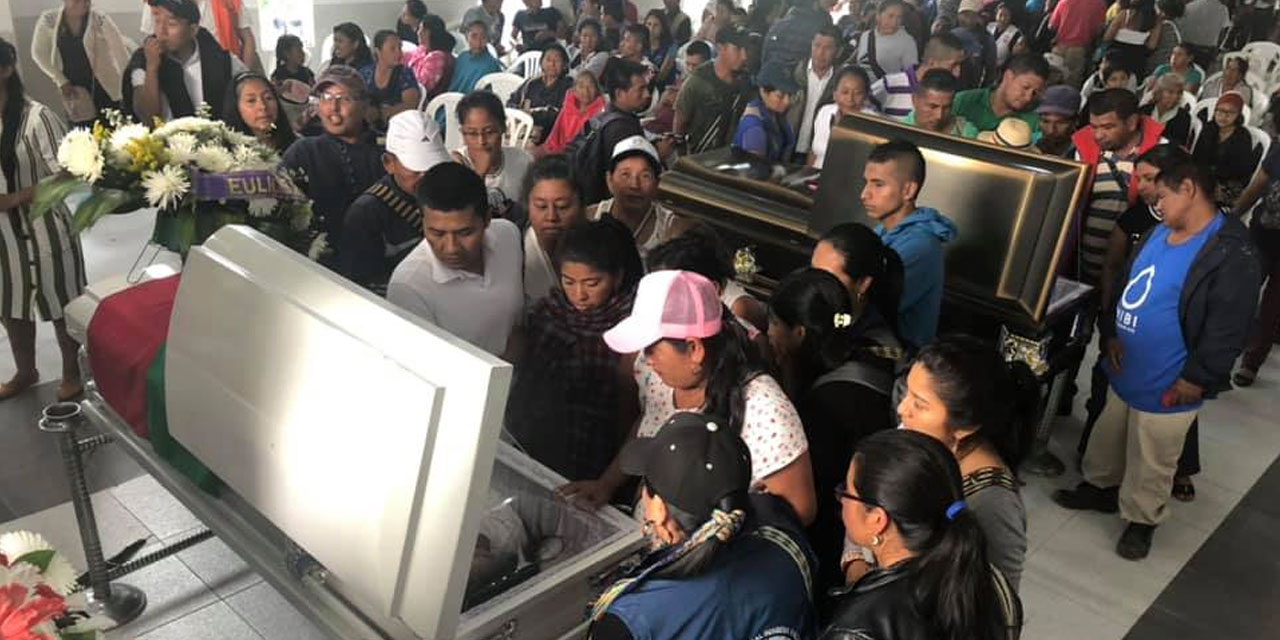
Indigenous leaders in Colombia are raising accusations of “genocide” following the latest massacre, in which five members of the Nasa people were killed in southwestern Cauca department. Cristina Bautista, a Nasa traditional authority, or neehwesx, was killed along with four members of the Indigenous Guard, an unarmed community self-defense patrol, on Oct. 29. The incident took place at the community of La Luz on the Nasa resguardo of Tacueyó, Toribio municipality. The Indigenous Guard tried to stop a car at a checkpoint maintained in the community. The driver refused to cooperate and a stand-off ensued, bringing Bautista and others to the scene. Eventually, the occupants of the car opened fire. In addition to five slain, several were wounded in the attack, and the assailants escaped. They are believed to be members of a “dissident” band of the FARC guerillas, which has refused to honor Colombia’s peace accords. The Indigenous Guard carry traditional staffs, but not firearms.
Bautista had been internationally recognized for her work in the region. She was a former “indigenous fellow” with the UN Human Rights Office and the recipient of a grant this year from the UN Voluntary Fund for Indigenous Peoples. UN Human Rights Office spokesperson Marta Hurtado said after the slaying: “We call on the authorities to establish a prompt, thorough, independent and impartial investigation into the…killings in Northern Cauca, including into possible failures on the part of the authorities that may have allowed the massacre to happen. We also urge the authorities to break the cycle of impunity relating to threats, harassment and killings targeting indigenous peoples.” (ReliefWeb, Al Jazeera, Nov. 1; ReliefWeb, Oct. 31; BBC News, Oct. 30)
A second massacre in Cauca immediately followed, with the discovery of five bodies Oct. 31 in Santa Helena community, Corinto, municipality. It was not immediately clear if the victims were indigenous peoples, or the circumstances of their deaths. (El Heraldo, Oct. 31)
Indigenous peoples have been particularly targeted in the ongoing wave of deadly attacks on social leaders across Colombia. On Oct. 13, another Nasa elder, Canas Velasco, was slain by unknown assailants in an attack at his home in Tacueyó. Community leaders again blamed FARC “dissidents,” who are believed to protect illicit cannabis and coca production in the region that indigenous authorities are attempting to phase out. With his death, the total of indigenous leaders slain in Cauca this year was brought to 36, by UN and government figures. The total for 2018 in the department was 26. (El Tiempo, Oct. 16; CRIC, Oct. 14)
Although Cauca has been particularly hard-hit, this is a trend throughout Colombia. On Oct. 17, Wayúu indigenous leader Oneida Epiayú was slain by unknown assailants as she ate at a popular restaurant in the town of Riohacha, La Guajira department. Her husband was among four injured in the attack. Reports noted at the time that this brought to 115 the number of indigenous people slain in Colombia over the past year. (Prensa Latina, Oct. 30; Contagio Radio, Oct. 18; El Heraldo, Oct. 17)
On Oct. 16, Embera indigenous leader Constantino Ramírez Bedoya was slain in an attack while he was riding his motorcycle on a road near the resguardo of Dachi Agore, Quindio department. (El Colombiano, Oct. 18)
The National Indigenous Organization of Colombia (ONIC) charges a campaign of “genocide” against Colombia’s indigenous peoples, and particularly names President Ivan Duque as complicit. Duque has been assailed for his refusal to talk to indigenous authorities, and his opposition to implementation of the peace deal with the FARC. (Colombia Reports, Nov. 1)
Photo: Colombia Reports




